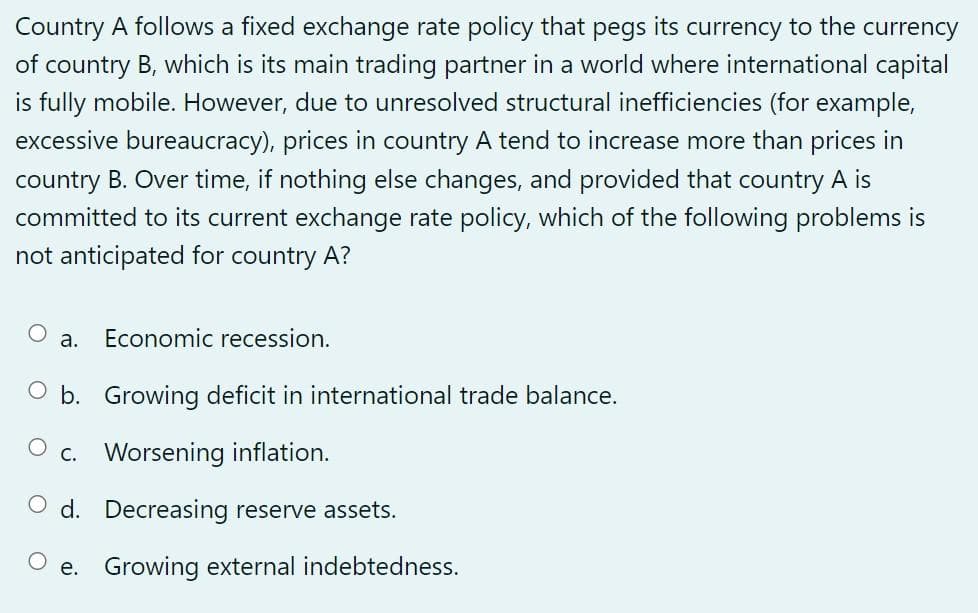Country A follows a fixed exchange rate policy that pegs its currency to the currency of country B, which is its main trading partner in a world where international capital is fully mobile. However, due to unresolved structural inefficiencies (for example, excessive bureaucracy), prices in country A tend to increase more than prices in country B. Over time, if nothing else changes, and provided that country A is committed to its current exchange rate policy, which of the following problems is not anticipated for country A? a. Economic recession. O b. Growing deficit in international trade balance. c. Worsening inflation. Od. Decreasing reserve assets. e. Growing external indebtedness.
Country A follows a fixed exchange rate policy that pegs its currency to the currency of country B, which is its main trading partner in a world where international capital is fully mobile. However, due to unresolved structural inefficiencies (for example, excessive bureaucracy), prices in country A tend to increase more than prices in country B. Over time, if nothing else changes, and provided that country A is committed to its current exchange rate policy, which of the following problems is not anticipated for country A? a. Economic recession. O b. Growing deficit in international trade balance. c. Worsening inflation. Od. Decreasing reserve assets. e. Growing external indebtedness.
Managerial Economics: A Problem Solving Approach
5th Edition
ISBN:9781337106665
Author:Luke M. Froeb, Brian T. McCann, Michael R. Ward, Mike Shor
Publisher:Luke M. Froeb, Brian T. McCann, Michael R. Ward, Mike Shor
Chapter11: Foreign Exchange, Trade, And Bubbles
Section: Chapter Questions
Problem 7MC
Related questions
Question

Transcribed Image Text:Country A follows a fixed exchange rate policy that pegs its currency to the currency
of country B, which is its main trading partner in a world where international capital
is fully mobile. However, due to unresolved structural inefficiencies (for example,
excessive bureaucracy), prices in country A tend to increase more than prices in
country B. Over time, if nothing else changes, and provided that country A is
committed to its current exchange rate policy, which of the following problems is
not anticipated for country A?
a.
Economic recession.
O b. Growing deficit in international trade balance.
c. Worsening inflation.
Od. Decreasing reserve assets.
Oe. Growing external indebtedness.
Expert Solution
This question has been solved!
Explore an expertly crafted, step-by-step solution for a thorough understanding of key concepts.
This is a popular solution!
Trending now
This is a popular solution!
Step by step
Solved in 2 steps

Knowledge Booster
Learn more about
Need a deep-dive on the concept behind this application? Look no further. Learn more about this topic, economics and related others by exploring similar questions and additional content below.Recommended textbooks for you

Managerial Economics: A Problem Solving Approach
Economics
ISBN:
9781337106665
Author:
Luke M. Froeb, Brian T. McCann, Michael R. Ward, Mike Shor
Publisher:
Cengage Learning

Economics: Private and Public Choice (MindTap Cou…
Economics
ISBN:
9781305506725
Author:
James D. Gwartney, Richard L. Stroup, Russell S. Sobel, David A. Macpherson
Publisher:
Cengage Learning

Macroeconomics: Private and Public Choice (MindTa…
Economics
ISBN:
9781305506756
Author:
James D. Gwartney, Richard L. Stroup, Russell S. Sobel, David A. Macpherson
Publisher:
Cengage Learning

Managerial Economics: A Problem Solving Approach
Economics
ISBN:
9781337106665
Author:
Luke M. Froeb, Brian T. McCann, Michael R. Ward, Mike Shor
Publisher:
Cengage Learning

Economics: Private and Public Choice (MindTap Cou…
Economics
ISBN:
9781305506725
Author:
James D. Gwartney, Richard L. Stroup, Russell S. Sobel, David A. Macpherson
Publisher:
Cengage Learning

Macroeconomics: Private and Public Choice (MindTa…
Economics
ISBN:
9781305506756
Author:
James D. Gwartney, Richard L. Stroup, Russell S. Sobel, David A. Macpherson
Publisher:
Cengage Learning

Exploring Economics
Economics
ISBN:
9781544336329
Author:
Robert L. Sexton
Publisher:
SAGE Publications, Inc

Economics (MindTap Course List)
Economics
ISBN:
9781337617383
Author:
Roger A. Arnold
Publisher:
Cengage Learning
